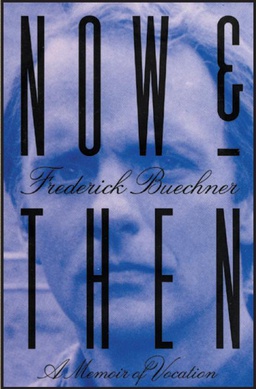Books like Now and Then: A Memoir of Vocation
Now and Then: A Memoir of Vocation
Of the three memoirs that Buechner wrote, this was probably my least favorite. I can’t bring myself to give this book less than 4 star. There are some hidden wisdom-gems that spoke especially to my life right now. Buechner writes of his middle life and college teaching career. He compares and contrasts Christianity to Buddhism and it is in those pages that I leaned the most from this book. He explains that the two religions are based around the same fundamental principal, love, but the ultimate goal and purpose for Love is quite different. Buddhism has 4 levels of Love and the last and highest form is upekkha- “the detached, dispassionate love which no longer makes or even recognizes distinctions of any kind but loves all people impartially, whether they are torturers of children or great humanitarians. There is something a little too cold-blooded and inscrutable about it to equate it to the Christian concept of agape as God’s love that shines forth on both the just and the unjust.” (P. 52)After describing the feelings of being a new parent Buechner writes: “‘He who loves fifty has fifty woes… who loves none has no woe.’ Said the Buddha, and it is true. To love another, as you love a child, is to become vulnerable in a whole new way. It is no longer only through what happens to yourself that the world can hurt you but through what happens to the one you love also and greatly more hurtingly. When it comes to your own hurt, there are always things you can do… But when it comes to the hurt of a child you love, you are all but helpless... There is no way to make him strong with such strengths as you may have found through your own hurt, or wise through such wisdom, and even if there were, it would be the wrong way because it would be your way, not his. The child’s pain becomes your pains, and as the innocent bystander, maybe it is even a worse pain for you, and in the long run even the bravest front is not much use… Side by side with the Buddha’s truth is the Gospel truth that ‘he who does not love remains in death.’ … To suffer in love for another’s suffering is to live life not only at its fullest but at its holiest.” (P. 56) Buechner never spells out how God’s love is like the love described above, but you come to that understanding as you read through the book. There is peace in that too, because God is much more able to handle our struggles than we are each other’s. Our love is messy, His love is perfect, and He is able to bear the burden of loving enough to let us grow. It’s also reassuring that the ultimate purpose of this whole thing isn’t nothingness or disconnected, but a full embrace of our humanity and our role in God’s epic story. This book is slim but dense and worth a read. (If you only have time to read one, read The Sacred Journey)
